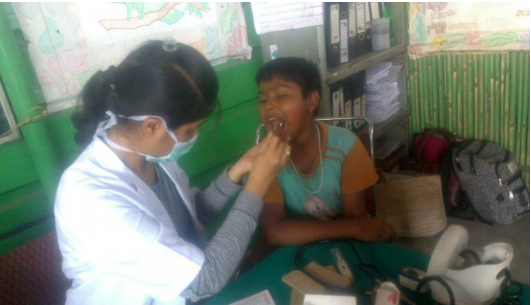Shelley Saxena, a mobile technology entrepreneur in Atlanta, had a head start when he launched SevaMob, a distribution system for low-cost preventive health services across India. But that didn’t save him from having to make a few strategic pivots as his new business grew.
Saxena used capital and intellectual property from his earlier startup, SaasMob, which provides tools for mobile-app developers, to launch the health service in his original hometown of Lucknow in the Indian state of Uttar Pradesh. The Cornell MBA and his founding partners scraped together $46,000.
SaasMob, his U.S. company, had developed a platform to provide information to farmers. But to fulfill the need for primary healthcare in mostly poor, mostly rural regions in India, Saxena knew the model had to be adapted for communities where literacy rates and smartphone use are low.
SevaMob is now providing services — basic primary healthcare, diagnostics, medicines and insurance — to more than 7,000 subscribers in Uttar Pradesh and four other states, including Karnatka and the National Capital Region around New Delhi.
Last year, he raised a bridge round of $227,500 as a step toward expected Series A financing this year to help it expand to three more states and test a model in sub-Saharan Africa.
SevaMob’s model “is innovative, scalable and replicable,” said Andy Lower, founder of ADAP Capital LLC, which led the bridge financing. “We believe in the massive potential of Sevamob’s disruptive primary healthcare model.”
Honing that model was tricky, however. The company dropped door-to-door checkups and policy enrollment because the approach proved too costly and time-intensive. It also scrapped some of its lowest-cost policies, like its $2.50-a-month student plans, which confounded the school principals who were supposed to collect the money.
SevaMob now partners with local institutions and governmental and non-governmental organizations to enroll groups of employees, students and others in insurance plans costing as little as $2-$3 per month. The plans cover semi-annual, on-site health checkups from homeopathic, ayurvedic and other well-trained but low-cost professionals who provide primary care, dental checkups and prescription medications. These professionals log patient data in an online healthcare platform that can be accessed by patients and partnering emergency care and specialist providers. Patients can also tap into the system by phone.
Saxena knew the data repository could become SevaMob’s ultimate value-proposition. “We know [every patient’s] medical history and can splice the data in a number of ways,” he says. SevaMob can tell a pharmaceutical company where to launch a new product, for example.
Last year, SevaMob introduced Seva360, an online health exchange that connects patients and healthcare providers. SevaMob collects transaction fees from the growing base of 400 providers who use the site to expand their services and patient reach. Patients with computer access or smartphones can schedule video and in-person appointments or check personal health data. Through a partnership with Alere, SevaMob can provide rapid diagnoses at the point of care.
Families and individuals with monthly income of between 6,000-25,000 rupees per month ($95-$400) now make up SevaMob’s key demographic. The majority of its plans cost cost between $4 and $9 a month, depending on the coverage package.
SevaMob still looks for opportunities to serve the true base of India’s pyramid, through partnerships with government, non-profits and foundations. With Texas-based Firdous Foundation, SevaMob provides healthcare for 2,000 orphans in Bangalore, Delhi and Lucknow. It has a partnership in Bangalore to provide HIV screening to more than 12,000 sex worker.
SevaMob got a lift from Village Capital, the startup accelerator, when it was selected by other entrepreneurs in its cohort for a $50,000 convertible note. Last year’s bridge round of $227,000 included ImpactAssets, Artha Venture Challenge and D3 Jubilee as well as ADAP. The company is not yet profitable, but has reached a break-even point in two states.
“Right now, we’re focused on growth,” Saxena says. “That’s where our investor targets are focused.”
[seperator style=”style1″]Impact[/seperator]
Financial
SevaMob is not yet profitable, but has reached break-even in two states.
Social
SevaMob serves more the 7,000 low- and lower-middle class Indians with primary healthcare, diagnostics, medicines and insurance.
[seperator style=”style1″]Disclosure[/seperator]
One of a series of impact profiles produced in conjunction with the Case Foundation’s new publication, “A Short Guide to Impact Investing.”











